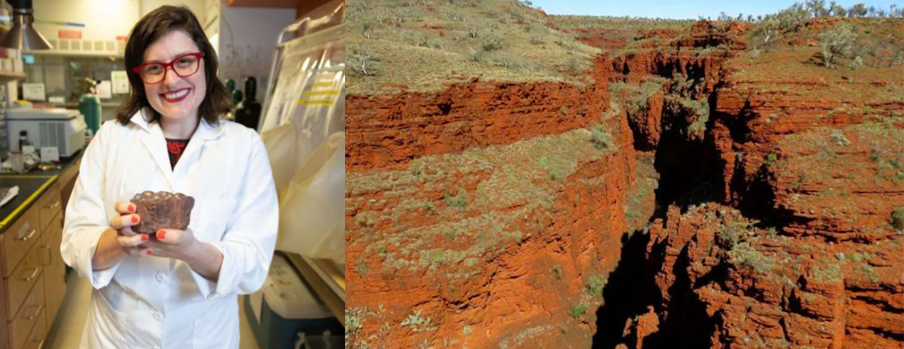-
Laughing Gas Could Have Helped Warm Early Earth
September 21, 2018 / Posted by: Miki Huynh
Left: Dr. Jennifer Glass holds a piece of stromatolitic ironstone. Research conducted in her lab at Georgia Tech points to the way in which nitrous oxide may have helped warm early Earth. Photo credit: Georgia Tech / A. Carter. Right: Banded iron formations in Karijini National Park, Australia. These sediments, once ancient seafloor, are red because iron rusted out of solution as oxygen built up in the water. The same dissolved iron facilitated production of nitrous oxide. Photo credit: Georgia Tech / J. GlassCarbon dioxide and methane get partial credit for keeping the early Earth ice-free, but established research suggests that those gases were not always sufficiently abundant to warm the globe on their own. A new view on ocean chemistry during Earth’s Proterozoic Eon, about 2.5-0.5 billion years ago, point to a possible way that nitrous oxide, also known as laughing gas, could have filled the “greenhouse gap.” Results published by scientists at Georgia Tech who are members of the Alternative Earths team, the NASA Astrobiology Institute team based at the University of California, Riverside, demonstrate a potential mechanism.
“Nitrous oxide from chemodenitrification: A possible missing link in the Proterozoic greenhouse and the evolution of aerobic respiration” is published in Geobiology.
- The NASA Astrobiology Institute Concludes Its 20-year Tenure
- Global Geomorphologic Map of Titan
- Molecular Cousins Discovered on Titan
- Interdisciplinary Consortia for Astrobiology Research (ICAR)
- The NASA Astrobiology Science Forum Talks Now on YouTube
- The NASA Astrobiology Science Forum: The Origin, Evolution, Distribution and Future of Astrobiology
- Alternative Earths
- Drilling for Rock-Powered Life
- Imagining a Living Universe
- Workshops Without Walls: Astrovirology